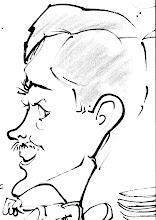. . . IN THIS MILLENIUM
Poems for which there are hopeful messages
of which no more may be said.
Poems for which there are hopeful messages
that are there if you would hear them
that are there if you would see them
that are also there if you would remember.
Poems in which there are realizations of blessings
if you realize
Poems in which the fun of thought emulates
the talk of other places
Poems in which all stored in your cognitive garage
comes out onto the driveway, is opened up
is put to use, is welcomed back into your life
like a friend.
Poems in which that which is not in them
clarifies the weather like the speed and shape of clouds
above the fields, or above the mountains.
Poems out of which come the changes they imply
but cannot be seen, since inside they are not
. . . or is it inside? like what you see in people
is not often what you view in their exterior.
Poems that like wallpaper change the environment
which changes how you feel inside a room.
Poems that serve as iodine to small infections
Poems that take out paradigms, sold to you at market
display their deceiving make, tell you who the
purchase serves besides yourself, and more importantly
besides the earth of your children, all of which are yours.
Poems that may cause danger to the speaker
because of the danger they warn.
Poems that stand like the lake you summered at
as a child, which may change as your many years progress,
but to which you will return, seeing more each decade.
Poems that you can pass to children like the one
expensive watch you ever bought, or which you
were given when you grandfather left.
Poems which are free and have high value.
And because they are free poems, choose themselves
who will be their readers
as one may choose a spouse, or choose a park. Pricing
selects the demographics. Poems you can also pay for
if you want them, or walk into the library
or borrow a friends book, or read in yesterday's newspaper
or hear from someone else, or listen to on the radio,
or watch on television, or watch as the sun comes up above the
pond and the trees just beginning to grow their leaves
glow with gold that is also free.
Poems that are free in being, freedom of speech,
and which shackle freedom of speech.
Poems that tie the people of the past
you don't admit often, to the people you become
yourself as life changes, to the people that
will come out of your every action and spoken word.
Poems that sing the glory of the sun, the sip of cool water,
the sounds you can hear as beauty, and can shape themselves
like blossoms in early March on a page or screen, or mind,
Poems that restate the sins of the past
and forgive them.
Poems that restate the imprisonment of the past
and of the present
and shake keys in the darkness so the imprisoned
will know where to reach for escape;
Poems that tell them in the darkness
that the keys are here, but sometimes far away.
Poems that dance with you, measure with you, count with you,
hope with you, cry with you, detect with you, cut with you,
glue back together with you, reproduce with you, subtract with you,
divide with you. Poems that shake the wooden table, shake the plaster
walls, shake the solid soil when spoken, or just seen, or just remembered,
like the aftershock of earth quakes.
Poems that by shadow will be seen, poems spoken so that
we will not even know from whence they came, or that they are
poems. Poems that were the slight change in a path
so many years ago, so that today we only really know where we are.
Poems that like their author are responsible for
the motions and the choices and acknowledge them or not
but make a change in a world culture that is good somehow.
Poems that think we need this to feel hope.
That is all I want to do.
